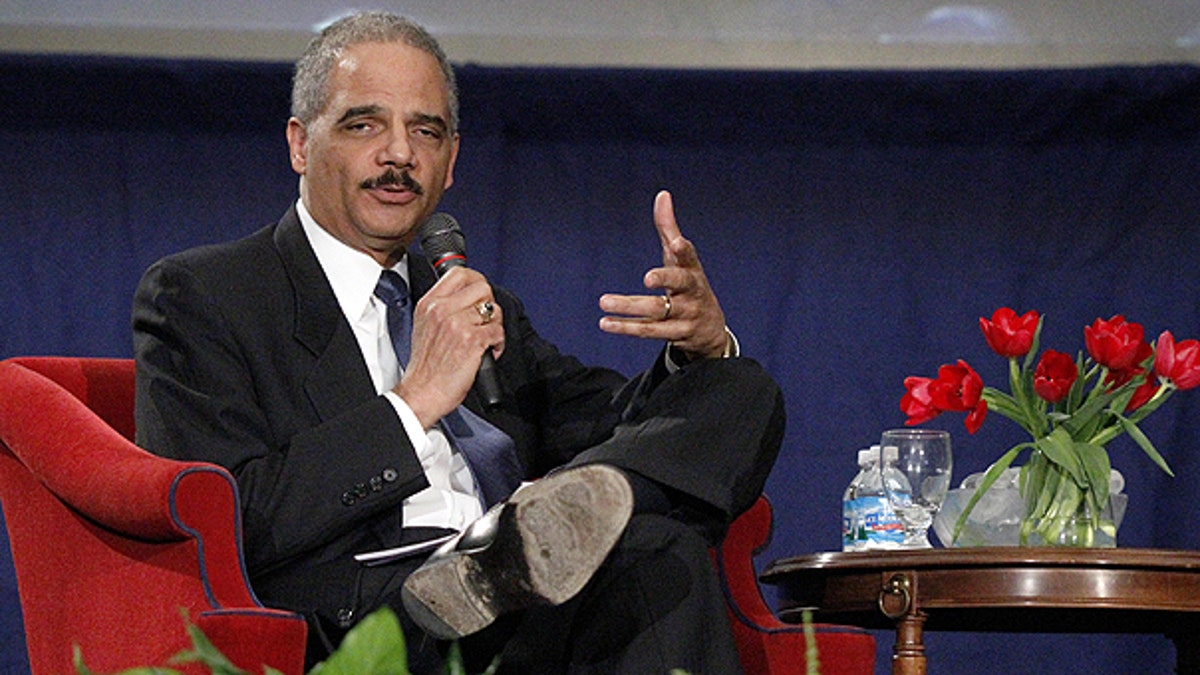
Feb. 23: Attorney General Eric Holder answers a student's question after his speech commemorating the 100th anniversary of the Duquesne University School of Law in Pittsburgh. (AP)
LOS ANGELES – U.S. Attorney General Eric Holder has invoked state secrets rules to prevent information from being released in a lawsuit filed by Southern California Muslims who claim the FBI monitored their activities solely because of their religion.
In a legal declaration filed late Monday, Holder makes a rare assertion of the state secrets privilege, arguing that it could cause significant harm to national security if the government is forced to reveal the subjects of a mosque-surveillance operation in 2006 and describe how the monitoring was carried out.
A judge must weigh the request, which comes after many details from the investigation, dubbed Operation Flex, have already been made public.
The key informant in the case, Craig Monteilh, turned against the FBI and described how his agency handlers taught him to ingratiate himself into the Orange County Muslim community then secretly gather cell phone numbers, email addresses and record conversations.
Monteilh claims the FBI even told him to talk openly about jihad in an attempt to solicit terrorist sentiments from community members. But instead of responding to his violent rhetoric, mosque-goers called the FBI to say they were worried about his statements.
Holder's declaration came in a motion to dismiss the bulk of a lawsuit filed against the FBI in February by the ACLU of Southern California and the Los Angeles office of the Council on American-Islamic Relations. Many of the allegations were based on Monteilh's claims.
The FBI has said it does not initiate counterterrorism operations based solely on a group's religion.
In its filing, the agency said a range of details Monteilh provided for Operation Flex remain properly protected counterterrorism investigative information.
"This includes ... precisely what that investigation entailed and why it was undertaken, the identity of particular subjects, and the reasons they were investigated," the document states.
Holder goes on to argue that if individuals knew they were under surveillance, they could "anticipate the actions of law enforcement and intelligence officers, possibly leading to counter-surveillance that could place federal agents at higher risk."
The Department of Justice said in a statement Tuesday it conducted a thorough review "to provide greater accountability for the use of privilege" by invoking it only in seeking dismissal of Monteilh's claims of illegal electronic surveillance.
"Officials specifically looked for a way to allow this case to proceed while carving out national security information, and concluded that some information about the allegations could be made available without compromising sensitive national security information," the statement said.
ACLU attorney Peter Bibring said it was extremely unusual for the government to invoke the state secrets privilege, especially in a domestic case being investigated by a domestic law enforcement agency. The secrecy rules are usually only requested in extraordinary matters overseas, such as the targeted killing by drones or extraordinary rendition.
"The government's position here is the FBI's conduct should be beyond the review of the courts, which would render the protections of the constitution meaningless," Bibring said. "Following the government's argument, any domestic law enforcement operation deemed to effect national security would be beyond review."
Bibring said the ACLU would oppose the government's motion.
___
Follow Watkins on Twitter at http://twitter.com/thomaswatkins

